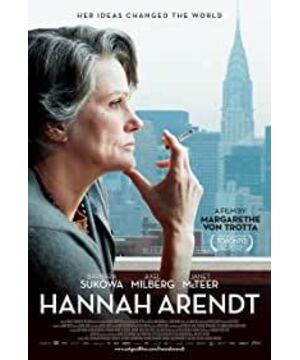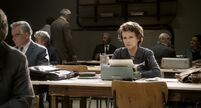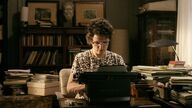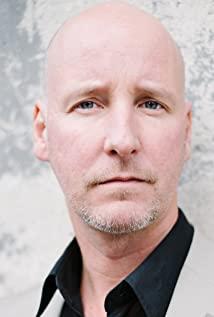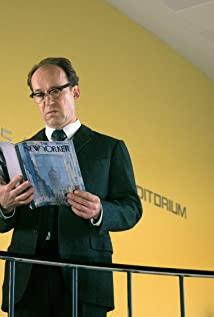Hannah Arendt is known as one of the greatest and most original thinkers and political theorists of the 20th century. He is deeply loved by her mentor Heidegger. She wrote "The Origin of Totalitarianism" after World War II. It is called a masterpiece by public opinion. Influenced by Husserl's phenomenology, middle-aged author of "Human Conditions", iterated the concepts of theory and practice in classical philosophy with the concepts of thinking and action. As a Jew born in Germany, she began to live in exile during World War II and taught in the United States in the 1950s. She was the first female full professor appointed by Princeton University.
It is not easy to tell such a story that is not a household name. The film does not adopt the usual biopic film method-condensed narrative, that is, to describe the famous events in the life of the character, and then supplement the emotion with cross-montage, which captures the judgment of the audience. This is the filming method of most celebrity biopics. However, this German film is full of critical connotations. It does not adopt a kaleidoscope structure. Instead, it objectively and frankly reproduces and discovers Arendt’s observations of the Nazi "death penalty executive" Eichmann’s court trial. All sorts of storms of public opinion after "Jerusalem". Her perspective goes beyond the Jewish nation and also challenges the emotional identity of her compatriots.
With the brightest stars in the vast philosophical sky, the rigorous speculative tradition of German thought has always had an impact on later generations. This film does not stop at presenting this individual female philosopher with great topical and academic accomplishments, but also aims to show the Jewish people's reflection and questioning in the face of the catastrophe, and recall the grief and pain of the passing away of their compatriots. It was in the pangs of the nation that Arendt's vigilance and thinking seemed deafening. She saw a kind of "banal evil", the numbness and non-thinking of individuals under Nazi totalitarianism, and people are like machines who vassalize and do evil. This kind of evil is mediocre and routine, which led Eichmann to execute slaughter orders again and again, which is exactly this kind of "banal evil".
At the end of the film, Arendt’s friends, colleagues, neighbors, and relatives left her because of her aloof philosopher. She stood alone by the window and said to herself: They didn’t realize that it was this mediocrity. Evil gathers radical forces and causes our misfortune. The camera turned to Arendt's philosopher husband, he took Arendt's shoulders, and asked: If you knew it would cause controversy and criticism after publication, would you still publish it? Arendt frowned and said: I will.
Arendt's honesty and courage in the face of truth, and the civic spirit based on it, went further than his teacher and lover Heidegger. As a disciple of basic ontology, Arendt did not stop at Heidegger's doctrine of existence and Dasein, but extended the practice of human life to the relationship between individual responsibility and political life. In the middle-aged Arendt, every time he fell into memory, a symbolic soothing picture appeared: the girl Arendt stood shyly and curiously in front of Heidegger, asking questions. Heidegger only said: Thinking is a part A lonely career.
It is far more difficult to shoot biopics of philosophers than politicians, scientists, or celebrities. It is often obscure and difficult because of the pleasure and pain of focusing on thinking, and the two layers of narrative in this film are relaxed. The first floor was towed by Eichmann's trial, and the camera panned among Jewish survivors. Outside the court, Arendt’s conversations with his close friends in Jerusalem also turned into her thoughts. The rigorous narrative advancement did not bypass any important plot evolution, until Arendt found the argument from the mountain of materials and court recordings. On the other floor, Arendt’s family and friends led her to bring out her life-like side. Chatting in group dramas seemed to test her bottom line of thinking. When she was with her girlfriend and husband, every line and scene All revealed her true side. Those slightly debated adjectives and dialogues speak of the intellectual rebellion and exquisite mischief of a female philosopher. At noon when they reunited with Heidegger, the two wandered in the birch forest in late autumn. Heidegger once again expressed his love and preached another sentence: the things you really like only appear in teenagers or young people, which is the so-called "love is First glance". There is also a strong metaphysical tone among the jokes.
Fortunately, this tone is not annoying, on the contrary, it also adds to the philosophical meaning of the film. As a biographical film, the brilliance lies in not deliberately showing the twisting and entanglement of the characters, not deliberately dramatizing the conflict and inner drama, but only shooting one event in a steady rhythm, and indulging in showing her without hesitating. Thinking, as she advocates, individual thinking and ethical awakening are both first and foremost.
-------------------------------------------------- -------------------------------------------------- ---------------------------
Personal original movie review public account loves to watch WeChat account: aikanai
movie opens a window, we see life, I also saw myself.
Original movie reviews, independent movie recommendations.
Let’s talk with you about the smiles, tears and heart-stamps that belong to you...
View more about Hannah Arendt reviews


